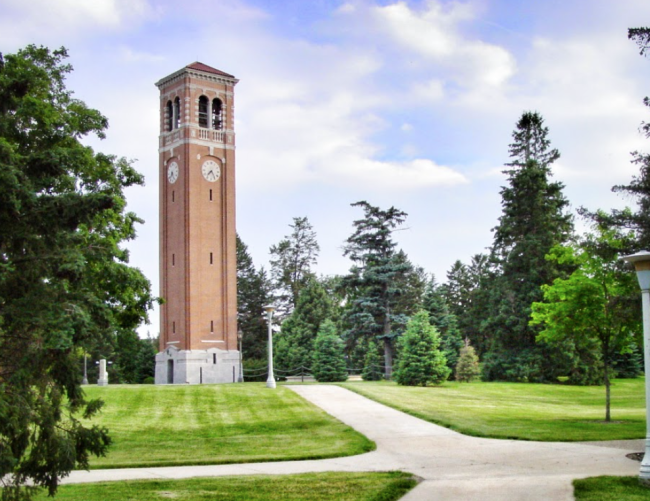You have /5 articles left.
Sign up for a free account or log in.

University of Northern Iowa
Academics in Iowa are fighting proposed legislation they say will ravage their unions, with negative consequences for the institutions as a whole. Observers say it looks like Wisconsin's union takedown all over again.
“Republicans said they were just going to tweak a couple things in the legislation on collective bargaining, but this isn’t tweaking -- they produced a bill that was nearly 70 pages long and completely gutted it,” said Joe Gorton, an associate professor of criminology at the University of Northern Iowa and president of its longstanding faculty union.
“We won’t be able to negotiate on evaluation, we won’t be able to negotiate on reductions in force or staff cuts or grievance procedures or health insurance -- all these things are all the table,” Gorton said of the potential impact of Iowa’s HSB 84.
Indeed, the bill specifically prohibits contract negotiations over insurance, leaves of absence for political activities, supplemental pay, transfer procedures, performance evaluations (for faculty members and other employees), procedures for staff reduction, grievance procedures for resolving questions arising under the agreement, and any employment “advantage” based on seniority.
Applicable to all employees except those in public safety, the bill also limits mandatory topics for negotiation to “base wages,” saying that pay increases shall be no more than 3 percent or the local consumer price index -- whichever is lower. Unions would have to be recertified by election prior to the end of every collective bargaining agreement in a two-thirds vote by all members, not just voting members -- a major effort, and at the union's expense. And the governor could reject agreements, even those agreed upon by employees and institutions.
Beyond concerns about faculty members’ collective bargaining rights, Gorton said he wondered how the bill would affect the university’s ability to recruit and retain top faculty as the only public university in Iowa with collective bargaining for professors. A recent union survey of its members found that 82 percent would consider leaving the university, either by seeking employment elsewhere or retiring early, if they lose the right to bargain collectively with Iowa’s Board of Regents. Some 97 percent of faculty members said collective bargaining was important for morale.
A number of members wrote in comments comparing the bill to controversial legislation that severely limited public-sector employees in Wisconsin, in 2011. Here are some examples:
- I am a Wisconsinite, so start with Wisconsin as cautionary tale … it appears that Iowa wants to follow its brother to the north in an ill-considered race to the bottom.
- I hope that the legislators can learn from the example of Wisconsin that what they thought would remove sources of unneeded cost to the state actually kept costs down, compared to what universities need to do now to attract good faculty.
- We are already paid less comparing to other equivalent institutions. Having a union was one of the pluses for me to accept the offer from [Northern Iowa].
- Collective bargaining was a major factor in my decision to make a career at [the university].
Northern Iowa's faculty union stands alone, but some professors at the University of Iowa publicly expressed interest in forming a union there in 2015, following a controversial presidential appointment. There are also other unions for higher education workers in the state, such as the graduate student assistant union at the University of Iowa affiliated with the United Electrical, Radio and Machine Workers of America. That union describes the bill as "horrible" and is asking members to fight, including by testifying against it at a Monday hearing in Des Moines.
"Iowa Republicans have launched a full-scale, Wisconsin-style attack against public sector unions and public education," union leaders said in a memo for members. "These bills would kill collective bargaining and unions in Iowa."
Gorton said his campus is still recovering from its own period of bad blood between the faculty and administration, over the university’s decision to discontinue nearly one-fifth of the university’s academic programs and close the laboratory school without consulting the faculty.
The new legislation in Iowa comes on the heels of a controversial bill to eliminate tenure at state institutions. But unlike that effort, which is increasingly unpopular -- and which the regents have opposed -- there appears to be broad support for the one limiting collective bargaining. It was introduced just this week but already has passed procedural votes in both the state House and Senate. The latter flipped to GOP control in November.
Republicans have said the bill is about giving employers more flexibility, including that to terminate poor performers and reward good ones. State Senator Jason Schultz, a Republican from Schleswig and chairman of the Senate's labor committee, still acknowledged some comparison to Wisconsin, however, the Associated Press reported.
"There are a lot of similarities, and it's because although our issues are not what Wisconsin's are in degree, they are similar. Therefore the solutions are going to be similar," he said. "But to the matter of degree, we are not Wisconsin and we approach this from a different direction."
In Wisconsin, legislation limiting unions was followed up by what many have called a legislative "gutting" of tenure protections for faculty members at public institutions. Public faculty members in Ohio staved off lawmakers' attempt to effectively end collective bargaining for most professors in 2015, in part by partnering with other unions in the state. The Iowa faculty union is embracing a similar strategy.
Gorton said efforts to limit tenure and collective bargaining for faculty members -- whether in Iowa, Ohio, Wisconsin or Missouri, where tenure is also being challenged -- were part of the same agenda to "devalue" public higher education.
"Public higher education in 50 years is not going to look like it did 50 years ago, and that's a problem for you and for me," Gorton said.
David Vanness, an associate professor of health population sciences at the University of Wisconsin at Madison who vocally opposed changes to tenure policies there, said he thought Iowa's "version of Act 10" -- as Wisconsin's blow to collective bargaining was known -- is that limiting bargaining to "small" increases in wages "would drastically limit faculty union power, and together with recertification could certainly harm membership."
What's happening in Iowa "certainly does seem familiar," he added.





